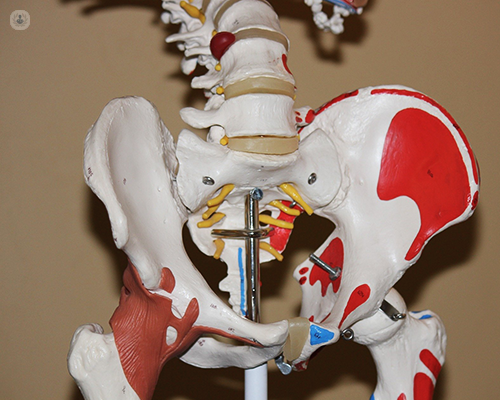How to know if your hip replacement is becoming loose (and what to do about it)
Autore:With time, hip replacements can become loose. But how does this happen and when should you see a specialist? Furthermore, what treatment could be required? Mr Adam Cohen, a UK leading orthopaedic surgeon, provides you with the answers.

What is causing my hip replacement to loosen?
Hip replacements are expected to last for at least 15 years. More often, they last up to 20 to 25 years. Several factors can contribute towards a loosening hip replacement:
- Over time, the wear between the moving parts of the hip causes slight destruction to the bone where the implant is fixed. This causes a ‘debonding’ of the implant which is what we commonly call loosening.
- If an infection occurs deep within the joint, the debonding process can occur earlier than normal.
- If you fall heavily and cause a fracture/breakage of the bone around the hip replacement, this can also result in loosening.
How would I know if my hip replacement is coming loose?
The most common symptom of a loosening hip replacement is the development of increasing pain. This would normally be felt during weight-bearing i.e. walking. Occasionally, the pain may not be persistent but may come on suddenly, particularly with a twisting movement of the leg. If loosening is particularly severe, the leg may begin to get shorter. This occurs because the stem within the femoral bone begins to move further down into the canal.
How commonly do hip replacements loosen?
Loosening occurs very slowly, so it is not a common problem unless the hip implant is getting to the end of its life i.e. more than 20 years.
When should I see a doctor?
My advice is that if you notice any new symptoms which relate to your hip replacement, you should seek advice from an orthopaedic hip specialist as it is normal to obtain new x-rays to check to see if there are any obvious problems with the implant. If there is any concern about the presence of infection, this may also require other investigations to be performed.
What should I expect when I visit a doctor?
If you are seeing an orthopaedic surgeon about your hip, I would expect that:
- They will ask you questions about the problems that you have been having and the time course of those problems.
- They should examine you to determine the source of the pain and should arrange appropriate investigations to help in diagnosing the source of the pain. These investigations might include x-rays and blood tests and in certain situations bone scans, CT scans or MRI scans.
What type of treatments will I be offered to correct this?
If the hip replacement is loose, the treatment depends on how loose the implant is and whether you are coping with your symptoms or not. Loose hip replacements often need to be ‘revised’ during revision hip replacement surgery, which means removing the parts which are loose and replacing them with new, well-fixed components. This type of surgery is usually more complicated and time consuming compared to a first time hip replacement. The surgeon should explain what he/she is planning to do and what the potential risks of the surgery are.
Visit Mr Cohen’s profile and discover how you can benefit from his highly professional and personalised patient care.


